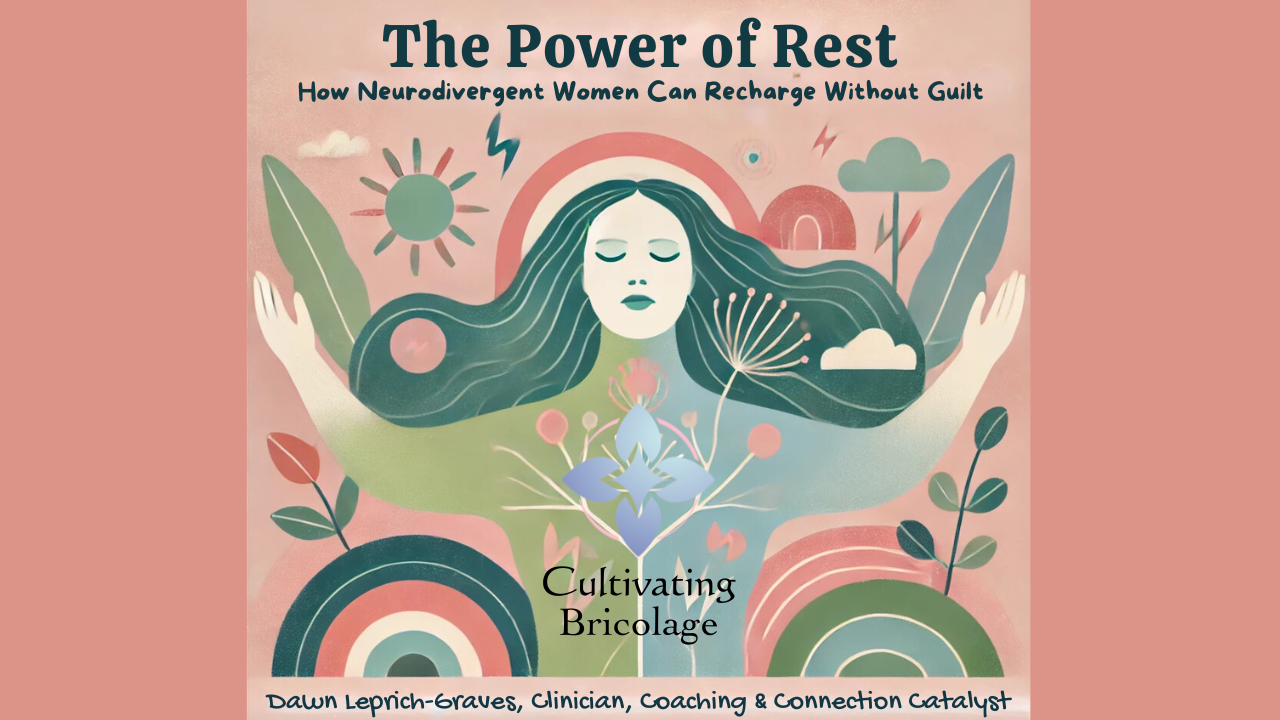The Power of Rest: How Neurodivergent Women Can Recharge Without Guilt
Feb 02, 2025
"Rest Isn’t a Reward—It’s Required"
For many neurodivergent women, rest feels like a luxury rather than a necessity. Maybe you’re haunted by the voice in your head telling you to “be productive.” Or perhaps you’re stuck in a cycle of go-go-go, only stopping when you’re completely burned out.
Here’s the truth: Rest isn’t lazy—it’s the foundation of everything you do. Let’s explore how to embrace rest, recharge your energy, and break free from the guilt that keeps you running on empty.
Why Neurodivergent Women Struggle with Rest
Rest can feel uncomfortable for several reasons:
- Perfectionism: Believing you have to “earn” your rest by achieving enough.
- Hyperfocus: Getting so absorbed in tasks that you forget to take breaks.
- Societal Pressure: The belief that productivity equals worthiness.
Spoiler alert: You’re allowed to rest—no strings attached.
The Science of Rest and the Neurodivergent Brain
Rest isn’t just about sleep or doing nothing. It’s about giving your brain and body the recovery time they need to function optimally.
Benefits of rest for neurodivergent women:
- Improves Focus: Regular breaks enhance cognitive performance.
- Reduces Overwhelm: Rest lowers stress levels and helps you feel more grounded.
- Boosts Creativity: Giving your brain downtime sparks new ideas and insights.
How to Embrace Rest Without Guilt
1. Redefine Rest
Rest isn’t one-size-fits-all. It can look like:
- Taking a nap or practicing mindfulness.
- Enjoying a hobby without a goal or timeline.
- Simply sitting in silence and letting your mind wander.
2. Schedule It Like a Priority
If rest isn’t built into your day, it’s easy to skip. Treat it like any other commitment by adding it to your calendar.
3. Start Small
If resting feels unnatural, begin with short, intentional breaks—just 5–10 minutes to start.
Types of Rest Neurodivergent Women Need
Not all rest is created equal. To truly recharge, you may need:
1. Physical Rest: Stretching, light movement, or lying down.
2. Mental Rest: Taking a break from decision-making or problem-solving.
3. Sensory Rest: Reducing input by dimming lights, silencing devices, or wearing headphones.
4. Emotional Rest: Journaling, talking to a trusted friend, or simply crying it out.
Tip: Tune into your body and ask, “What kind of rest do I need most right now?”
Overcoming Rest Guilt with Self-Compassion
Guilt often whispers, “You’re wasting time.” But rest isn’t wasted—it’s an investment in your well-being.
Try this affirmation:
“Resting allows me to show up fully for the things that matter most.”
Rest as Resistance
In a world that glorifies hustle, choosing rest is a radical act of self-care. “Your worth isn’t measured by your productivity. It’s measured by how well you honor yourself.”
Ready to Reclaim Rest? Let’s Work Together.
If rest feels out of reach, my coaching program for neurodivergent women can help you create space for rest and recharge. Together, we’ll build strategies to honor your energy and prioritize your well-being.
Let’s make rest a regular part of your life.
– Dawn Leprich-Graves, Cultivating Bricolage, coaching

